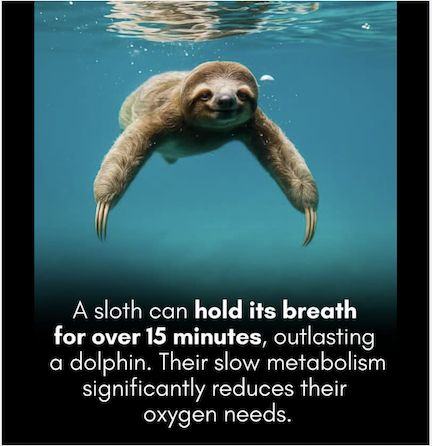The Ways of a Sloth

Yes, it's true. In fact, they can actually hold their breath up to 45 minutes at a time.
Believe it or not, yes! Sloths can hold their breath for up to 40 minutes, while dolphins typically last around 10 to 15 minutes before surfacing for air. Sloths have an incredibly slow metabolism, which allows them to reduce their heart rate and conserve oxygen when submerged. Meanwhile, dolphins, as mammals, need to breathe frequently despite their aquatic lifestyle.
The reason these land-dwelling, super submersibles are so adept at breath holding is due to some unique physiological characteristics:
Their secret lies in their low metabolic rate and unique respiratory control:
Slow Metabolism: Sloths burn energy at an incredibly slow rate, which means their bodies require less oxygen than most mammals. This allows them to hold their breath much longer without experiencing distress.
Bradycardia (Reduced Heart Rate): When submerged, sloths can slow their heart rate by up to one-third, significantly reducing their oxygen demand. This trick is common in diving animals like seals but is unusual for a land-dwelling creature.
Efficient Oxygen Storage: Sloths have a high concentration of myoglobin in their muscles, which helps store oxygen for prolonged periods. This trait is typically seen in deep-diving marine mammals like whales and dolphins.
Minimal Movement: Their famously slow and deliberate movements mean they don’t burn oxygen rapidly, further extending their ability to function without fresh air.
All of these adaptations make sloths surprisingly well-equipped for survival—even underwater!
When it comes to their biology and physiology, sloths are some pretty amazing creatures. Yet these very characteristics — like their unusually slow metabolism and sluggish movements — have given them a pretty bad rap in Scripture.
"Do not be slothful in zeal, be fervent in spirit, serve the Lord" (Romans 12:11, ESV).
"The desire of the sluggard kills him, for his hands refuse to labor. All day long he craves and craves, but the righteous gives and does not hold back" (Proverbs 21:25-26, ESV).
"But his master answered him, ‘You wicked and slothful servant! You knew that I reap where I have not sown and gather where I scattered no seed?'" (Matthew 25:26, ESV).
"So that you may not be sluggish, but imitators of those who through faith and patience inherit the promises" (Hebrews 6:12, ESV).
And a plethora of other references ...
The message is clear: The sloth may be perfectly acclimated for water survival, but he is utterly unequipped for spiritual survival. The ways of the sloth are not to be envied.
Christianity Is Inconvenient
Michael Harthorne with NEWSER writes:
It seems millennials are waging a new generational war—and the enemy is Cap'n Crunch. The Washington Post reports the sale of breakfast cereals in the US is down nearly 30% over the past 15 years. Part of that is growing preferences for things like smoothies and protein bars, according to the New York Times. But nearly 40% of millennials in a recent survey said eating cereal was "inconvenient ... because they had to clean up after eating it."

It should be no surprise that along with cereal sales, Christianity is in decline in America today. That’s because Christianity is a religion of inconvenience. It calls us to “take up our cross” and follow Jesus in selfless service (Matthew 16:24). It calls us to not only clean up after ourselves, but to be willing to help others do the same.
“Brothers and sisters, if someone is caught in a sin, you who live by the Spirit should restore that person gently. But watch yourselves, or you also may be tempted” (Galatians 6:1).
There is no other religion as inconvenient as the one modeled by Christ.
Not-So-Sudden Sudden Disaster
“According to the Associated Press,” reports Craig Larson, “on December 14, 1996, a 763-foot grain freighter, the Bright Field, was heading down the Mississippi at New Orleans, Louisiana, when it lost control, veered toward the shore, and crashed into a riverside shopping mall."
On hundred sixteen people were injured, parts of the wharf were demolished, as well as significant damage incurred to neighboring shops, restaurants, and hotels.
Says Larson:
After investigating the accident for a year, the Coast Guard reported that the freighter had lost control because the engine had shut down. The engine had shut down because of low oil pressure. The oil pressure was low because of a clogged oil filter. Ant the oil filter was clogged because the ships crew had failed to maintain the engine properly.
Larson concludes, “Sudden disasters frequently have a long history behind them”
“Do not be deceived: God cannot be mocked. A man reaps what he sows” (Galatians 6:7).
“Give your complete attention to these matters. Throw yourself into your tasks so that everyone will see your progress” (1 Timothy 4:15, NLT).
“Whoever is slack in his work is a brother to him who destroys” (Proverbs 18:9, ESV).
“The hand of the diligent will rule, while the slothful will be put to forced labor” (Proverbs 12:24, ESV).